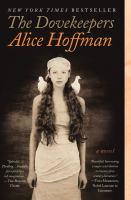
The Dovekeepers by Alice Hoffman is a difficult yet rewarding read—if you can stick with it. The novel tells the story of four strong-willed and resourceful women living in Masada, a mountain plateau in the Judean desert, in 70 C.E. The book is divided into four chapters with each chapter dedicated to a first-person narrative from one of our four leading females. The connecting detail of this quartet is that each woman is a dovekeeper, responsible for tending to and caring for the dove cote which supplies much needed manure for growing crops in the desert.
The story opens with Yael, the daughter of an assassin who holds her responsible for her mother’s death during childbirth. We then hear Revka’s tale, which is marked by the merciless murder of her beloved daughter, which leaves her daughter’s two sons in Revka’s care. Next we learn of the secrets of Aziza, a girl forced to live as a boy for her own protection, who is trained as a warrior who becomes an excellent marksman. Lastly, we hear from Shirah, an older woman trained in ancient medicine who possesses insight into mystical practices.
Each of these four protagonists is hiding secrets, doing what she feels necessary to survive during a time that is particularly harsh and unforgiving to women. When the Romans lay siege to Masada, the women are each forced to take actions that reveal her true character.
I read this book for book club, and the feelings of the group were somewhat mixed. All thought that it was a well written, historically accurate and powerful work of literature. However, several people had trouble reading specific chapters, namely Yael’s chapter, which is the first and longest. Once through her story, however, most found the book more gripping and readable. The subject matter is heavy and less than uplifting, but also empowering and humbling, as contradictory as that may seem. Those who enjoy The Dovekeepers may also enjoy The Red Tent by Anita Diamant or Maggie Anton’s Rashi’s Daughters trilogy, all of which feature strong, Jewish female characters living during ancient times. For a more modern book, one might try Reading Lolita in Tehran by Azar Nafisi.
